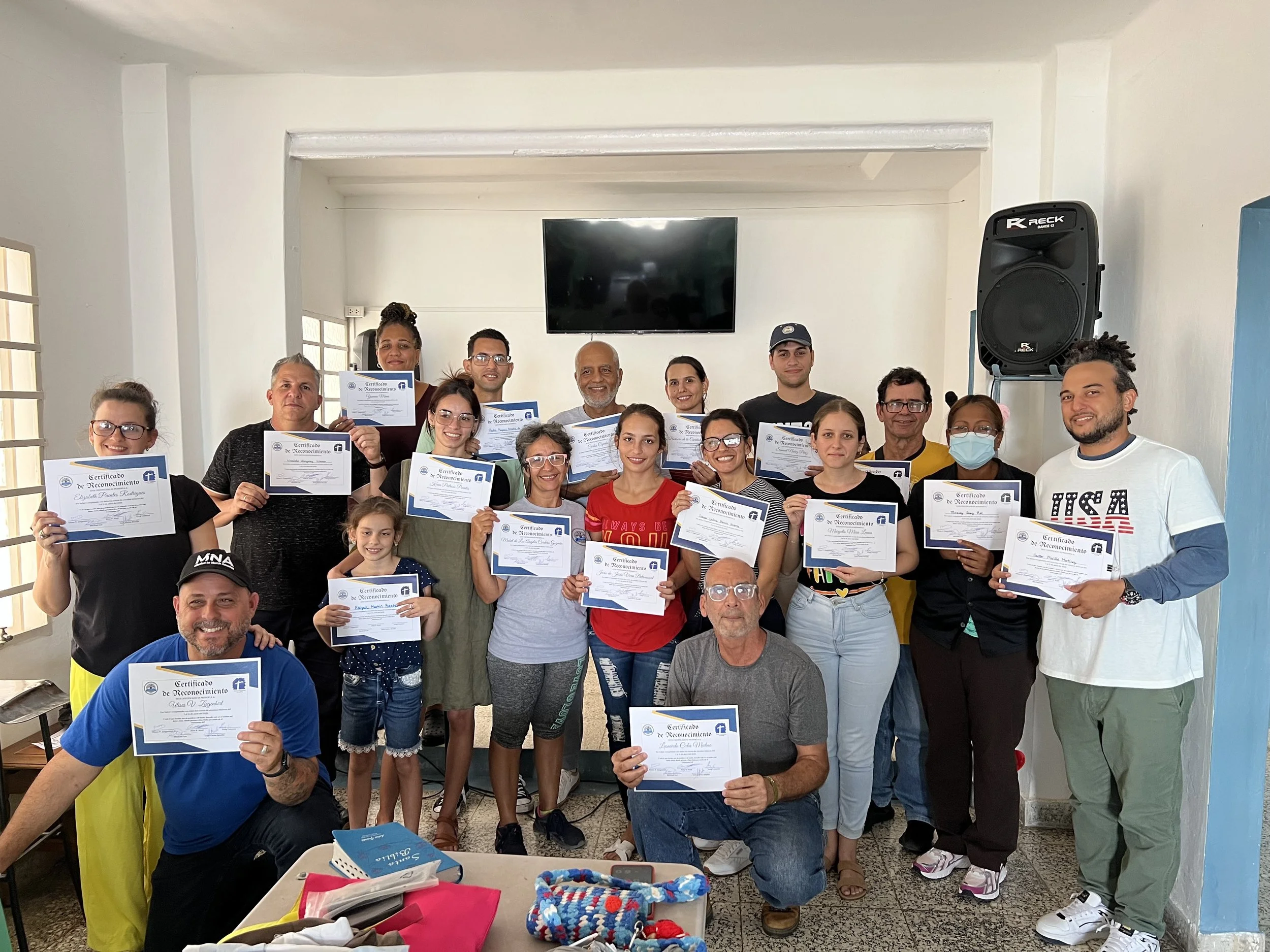What We Teach
Training and Coaching National Pastors and Church Leaders Through Latin America
In August of 2025, something extraordinary happened: we signed a partnership agreement with key church leaders in Bolivia, an Association of Churches that has a membership of 1,000 churches in the whole country.
Statistics show that 53% of pastors do not feel seminary or Bible college prepared them adequately. 90% say they have not received adequate training to meet the demands of ministry.
God is opening the door for us to train and coach national pastors and church leaders. This could shape the future of these pastors and church leaders in Bolivia and throughout Latin America.
But we can’t do this without you. To train these pastors and church leaders, we need your financial support. Each missionary family is supported solely by the generosity of believers. When you click on “Fund," you will see a category for the list of our missionaries.
Some of the topics we cover are…
-
The Church (believers) is the main instrument to change the world, through the power of God. The church, like living beings, should multiply. However, it takes practical training and a path, step by step planning. (I Corinthians 3:6; Acts 14:21-23; Titus 1:5)
-
The gospel is not only for salvation (justification), but it is how the believer grows (sanctification) and walks in his life. It is the power for life and ministry. (Romans 1:16; Galatians 2:16; Galatians 3:1-3)
-
There is a saying that goes, "If you don't know where you're going, you'll be lost when you get there...". It is very important that leaders have a vision for the church so that people follow them with confidence. Without vision, where are you going? Where do you want to go? (Proverbs 29:18)
-
Churches grow for spiritual reasons, fulfilling a divine command to spread their faith and make disciples, and for practical reasons, such as strengthening community, providing purpose, and meeting the spiritual and physical needs of their members and surrounding communities. Growth is also seen as a natural result of individuals maturing in their faith, building strong relationships, and engaging in effective outreach and service. The primary driver for church growth should be the Great Commission. We seek to help churches become healthy and therefore, grow. (Matthew 28: 19 - 20)
-
To be a good soccer player, the player needs training. Although he was born with gifts, without development, he never improves his skills. The same goes for biblical leaders. Every leader needs to develop to become a leader who takes care of the church and his people. (2 Timothy 2:2; I Corinthians 11:1)
-
Based on Isaiah 58:11, this workshop encourages women to grow in their love and knowledge of God's Word to be like a "well-watered garden." We also discuss many practical ways to start and lead a women's ministry in your church. - Ruth Bonilla (Missionary)
-
The majority of people say that they make a profession of faith in Christ before the are of 21. Many times, we see that teenagers define where a family goes to church, yet most worship services are designed for older adults. We want to deal with how to develop a ministry that reaches teenagers with the Gospel.
-
Sixty-three percent of people between the ages of 4 and 14 follow Jesus. This is a fun and interactive workshop that covers topics on the importance of having a children's ministry, areas to include in a children's ministry, how to creatively tell a Bible story and how to manage children's behavior. It also includes a workshop on how to share the gospel with children using the Wordless Book. (Proverbs 22:6; Psalm 78:4, 7) - Ruth Bonilla (Missionary)
-
The theological basis in Scripture concerning the mission of God is found in the words of Jesus himself: “As the Father has sent me, even so I am sending you” (John 20:31) ( see also 3:17; 5:30; 11:42; 17:18). The Mission of God is the overarching theme in the Bible where the triune God is portrayed as Sender. God the Father sent the Son to accomplish this redemption (John 3:16; 1 Pet. 3:18). The Father and the Son sent the Spirit to convict men and women of sin, righteousness, and justice (John 6:44, 16:7-11; 1 Cor. 12:3). God himself empowers and sends the church to witness by word and deed (Acts 1:4-8; John 20:21; Eph. 4).
-
Missions are firmly grounded in the Scriptures. It is crucial for those involved in missions or aspiring to be, to understand that we are called to study the Scriptures to comprehend the biblical foundations of missions. The Old Testament is a missionary book because God is a missionary God. The Great Commission, a divine call to make disciples wherever we may be, is recorded in the four Gospels and in Acts.
(Mat 28:18-20; Mar 16:15-18; Luk 24:46-49; Jn. 20:19-23; Acts 1:8).
-
You’ll learn with us that Evangelism is the most powerful tool God has bestowed upon His people to reveal His presence and invite others to partake in the abundant and eternal life offered through His Son, Jesus Christ. This widely employed tool doesn’t become a burden or an arduous task; instead, it yields joy and enthusiasm when used correctly. In this Evangelism workshop, we’ll explore not only the surface-level aspects and fundamentals, but also delve into the Scriptures. This comprehensive approach ensures that your learning experience during the workshop serves as the most significant step towards sharing the love of Jesus with others.
Evangelism is the proclamation of the good news about Jesus and the coming of God’s Kingdom. The Greek verb most commonly used for evangelism is euangelizesthai, and it means “to announce good news.” It appears 52 times in the New Testament. The noun form is euangelion, and it simply means “good news.” It occurs 72 times, mostly in Paul’s letters. Evangelism presents “the gospel by word, deed, and presence so that men and women around the world might come to know Jesus” (Dictionary of Mission Theology Evangelical Foundations).
God sent Jesus Christ to the world so that whoever believes in him should not perish but have everlasting life (John 3:16).
-
It is so important for believers in Christ to learn from the very beginning of their journey in the Christian life about the effect that the natural process of growing in Christ can have in evangelism. Non-Christian family members, friends, co-workers, and neighbors look into the lives of Christians and will wonder why they are living the kind of life that reflects hope, trust, love, joy, acceptance, discipline, and peace (Galatians 5:22-23). When our lives provoke this kind of living, we can share our story, the story of how God invited us to be a part of His family. Lifestyle evangelism is the fullest embodiment of sharing the gospel.
“but in your hearts honor Christ the Lord as holy, always being prepared to make a defense to anyone who asks you for a reason for the hope that is in you; yet do it with gentleness and respect,” 1 Peter 3:15
-
The Jethro Principle is a biblical leadership concept from Exodus 18 where Jethro, Moses's father-in-law, advises him to delegate responsibilities by appointing capable, trustworthy men to lead smaller groups, thereby reducing Moses's workload and improving the overall organization of the Israelite nation. This principle emphasizes the importance of delegation, talent identification, and establishing a clear, hierarchical leadership structure to manage large groups effectively.
(Acts 2:42-46; Romans 16:5; 1 Corinthians 16:)
-
Conflict resolution in the church involves applying spiritual principles and biblical teachings to navigate disputes, emphasizing prayer, humility, love, forgiveness, and seeking reconciliation over winning. Key strategies include encouraging empathy, open and honest communication, and listening with a goal to understand others' perspectives, as outlined in biblical passages such as Matthew 18:15-17. Utilizing mediation by a trusted third party or leader can also help facilitate a fair and biblically sound process for resolving issues and maintaining unity within the church community.






